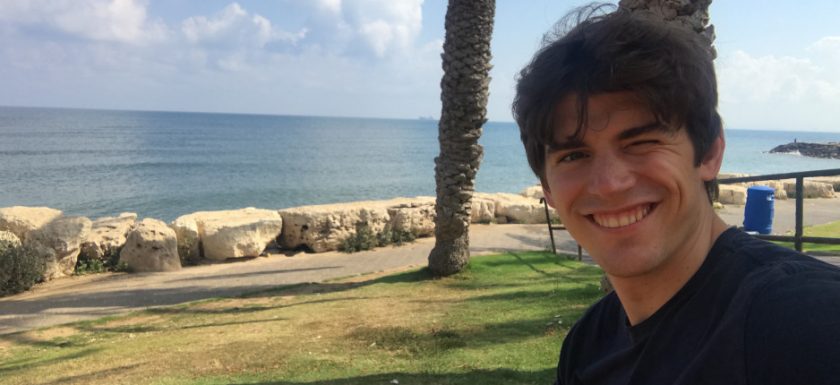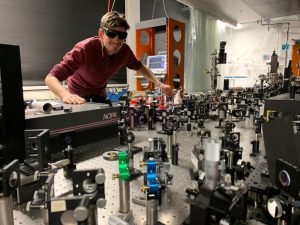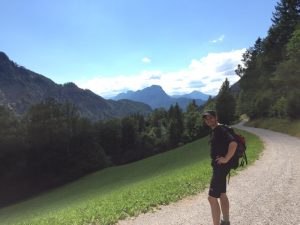
Markus Schleuning is a true Berliner, which is a rare condition among the international doctoral students at HZB. He studied physics at TU Berlin and is now doing his doctorate at the HZB Institute for Solar Fuels as part of the international graduate programme HI-SCORE, which includes exchange with partners in Israel.
How did you come to do a PhD?
I had a lot of fun doing my Master’s thesis. Meeting and discussing with PhD-students, I could imagine that this would be something for me, too. As a physicist, you are trained for research, so a doctorate is almost a logical next step. And when I discovered the PhD position in the international HI-SCORE programme on the internet, I really wanted to do it.
What did you like about HI-SCORE?

It involves an exchange with the best research institutes in Israel. I already knew the country a little and found it very exciting. There’s a great entrepreneurial spirit there, it’s a start-up nation, there’s great food and culture too. Of course, the PhD position was also a good fit in terms of content; I had studied the properties of semiconductors by means of time resolved spectroscopy in my Master’s thesis already. Also, now I am analysing the properties of semiconducting metal oxides using similar methods, especially time resolved THz spectroscopy.
You are now in your second year. Have you already done research in a lab in Israel?
Yes, I was at the Technion in Haifa in February and March 2020. The campus is located up on a hill and really beautiful. I was very well trained there by two researchers and worked on optical modelling and in their photoelectrochemistry labs. Actually, a longer stay was planned, my wife wanted to join me and do an internship in her professional field. But then Corona came in March and I had to fly back head over heels. It was very surreal, the plane was hardly occupied, just a few young people doing voluntary service and me.
So how did you get on with your PhD during that Corona year?
 I actually used the time of the first lockdown to reflect on what I had done so far. For example, I studied the standard text book “Physics of solar cells” from Peter Würfel again very thoroughly, and that helps me a lot now. What I find more difficult during the pandemic is communication. Of course, we have virtual meetings, video conferences and so on. But it’s all rather focused on work; the purposeless encounters are missing, the ones just happening by serendipity. However, these are the conversations where ideas emerge. Therefore, I call my colleagues more often via phone to discuss things.
I actually used the time of the first lockdown to reflect on what I had done so far. For example, I studied the standard text book “Physics of solar cells” from Peter Würfel again very thoroughly, and that helps me a lot now. What I find more difficult during the pandemic is communication. Of course, we have virtual meetings, video conferences and so on. But it’s all rather focused on work; the purposeless encounters are missing, the ones just happening by serendipity. However, these are the conversations where ideas emerge. Therefore, I call my colleagues more often via phone to discuss things.
What else are the challenges?
You can develop many ideas and do initial experiments, then you have the data and many interesting threads that emerge. I find it challenging to bring the threads together again at the end. I mean turning experiments and measurement data into solid work that can be published. That’s a long way down the road.
Where have you got better?
I don’t really enjoy working on my own, but I’m discovering it. I also learned to read much faster, in a speedreading course, and that’s useful because I have to read a lot of publications. In the past, I also didn’t always sort my measurement data optimally, that has also improved, but of course I’m still on a learning curve.
What are your plans for the coming year?
I have to take things into my own hands and push them forward, that’s part of doing a doctorate. So, Of course I get support, but I have to actively ask for it. I also would like to resume the exchange with the Israeli group, and I just have to keep at it so that it works out. It’s also very important now not to start new projects all the time, but to bring some good projects to a conclusion and publish them.
And how do you relax from work?
I often cycle to the lab, that’s 23 kilometres, one way, so this helps relaxing the mind. I’m also involved since a long time in the Boy Scouts, right now I’m active as chairman (in Berlin-Brandenburg). And in a few weeks, we’ll have our first child, how relaxing this will be remains to be seen.
Thank you for the interview and good luck!
More Information on the Helmholtz International Research School HI-SCORE
HZB has established the Helmholtz International Research School HI-SCORE in cooperation with the best Israeli universities and graduate schools in both countries in order to conduct solar energy research, and exchange PhD students while providing them with binational supervision up to their graduation.
